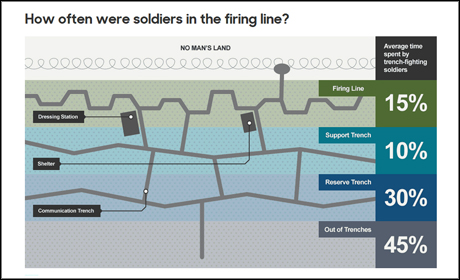
The BBC has launched a range of new interactive guides designed to "unlock the learning potential" of its digital content.
BBC iWonder combines both newly-commissioned and archive content that is rich with video, audio, text and graphics, presented by historians and experts.
"Over the last 15 years BBC Online has produced some really fantastic factual and educational content," Chris Sizemore, executive editor at BBC Knowledge & Learning told Journalism.co.uk.
"And so we identified an opportunity that would play to the strengths of that."
The first eight guides launched this week all tie in with the BBC's World War One season to mark the centenary of The Great War.
However, more iWonder guides are set to launch throughout the year, covering topics from science to natural history, arts, religion and ethics.
The guides are designed to challenge opinions. For example, How did so many soldiers survive the trenches?, presented by Dan Snow, challenges the common perception that this was where the majority of WW1 soldiers died.

Screenshot from BBC iWonder
"The guides are not designed to be news, they're designed to deliver reflection," explained Sizemore. "And that's why they're led by a question. You think twice about something, or maybe you think twice about yourself."The guides are not designed to be news, they're designed to deliver reflectionChris Sizemore, BBC
The project was partly inspired by Lab UK, a BBC website which spawned The Great British Class Survey in 2011.
"Lab UK is inspirational because essentially it's a learning journey that's about something inside yourself which leads to science," said Sizemore. "I think we'd like to utilise that ethos in iWonder."
Another inspiration, he said, is the way people use YouTube.
"YouTube has a really simple format, but look at all the different uses it has been put to, from tutorials on how to paint your walls or play Super Mario Brothers to a piece of comedy.
"Similarly, with iWonder guides we tried to create a format that could potentially reach different audiences and deliver different kinds of editorial."
The guides are also designed to tie in with different products across the BBC portfolio, including TV, radio and iPlayer. For example, coverage of the Commonwealth Games could link back to an iWonder guide on what it takes to be a great long-distance runner. Or a historical drama about the Tudors might link back to a guide about Anne Boleyn.
Sizemore defines the project as "a pan-genre endeavour," something he describes as "purposefully putting different genres next to each other to see where the sparks fly."
As well as traditional learning environments such as classrooms, Sizemore said the guides are aimed at "lifelong learners" – essentially anyone with an interest in a certain area.
The project also allows BBC Online to make the most of its vast archive, he explained. While most of the WW1 content is new, a lot of the guides set to be released over the next 12 months mix new and archived content.
“Over the last 15 years BBC Online has produced some really fantastic factual and educational content,”said Sizemore.
"Part of our mission is to unlock the learning potential of our archive and iWonder gives us a highly curated editorial storytelling reason to be doing that.Part of our mission is to unlock the learning potential of our archiveChris Sizemore, BBC
“We wanted to migrate that into a new format so we could put some editorial love into it.”
Another way of freshening up archive content is to use well-known presenters such as Dan Snow, Kate Adie, Neil Oliver and Ian McMillan – all of whom play a "very hands-on creative role" in the guides, said Sizemore.
"The guides are very presenter and talent-led, which hasn't always been the case in the factual space on BBC online," he explained.
"By commissioning a recognisable face to present the guide it makes it more appealing to people.
"It's the kind of things we do on TV and radio all the time. Bringing some of that into the iWonder guides is a bit of an experiment, but my gut instinct tells me it's a good way to connect with audiences."
Journalism.co.uk has previously looked at other examples of how news outlets are refreshing archive content on digital platforms.
The iWonder project has been seven months in the making, with Sizemore working alongside executive producer Tim Plyming and executive producer manager Andrew Pipes as well as online production teams based in London, Glasgow and Cardiff.
iWonder utilises some of the BBC's existing publishing systems – the video part is "borrowed" from iPlayer and the CMS is also shared by a couple of other departments.
However the front-end of the platform is entirely new, something which Sizemore said shows "the freshness of the format".
The first eight guides, which have all been built to work across laptops, tablets and smartphones, are "a bit of an experiment" in the new platform, said Sizemore.
For example, the team spent some time working out the optimum length for video clips, eventually deciding on under three minutes "except in extraordinary circumstances".
"You want it [the video] to feel like it's giving real depth to your understanding of the subject but you also want it to feel 'of the 21st century web' – snackable and digestible," Sizemore explained.
In future, he hopes to add even greater interactivity to the iWonder guides – elements such as interactive videos, quizzes and clickable infographics.
Ultimately, the aim is for iWonder to be a "one-stop-shop for factual and education content", said Sizemore.
"I think the promise in the future is that the tendrils of iWonder can reach out to the rest of the BBC online estate, and offer people some 'iWonderousness' wherever they are."
Free daily newsletter
If you like our news and feature articles, you can sign up to receive our free daily (Mon-Fri) email newsletter (mobile friendly).









